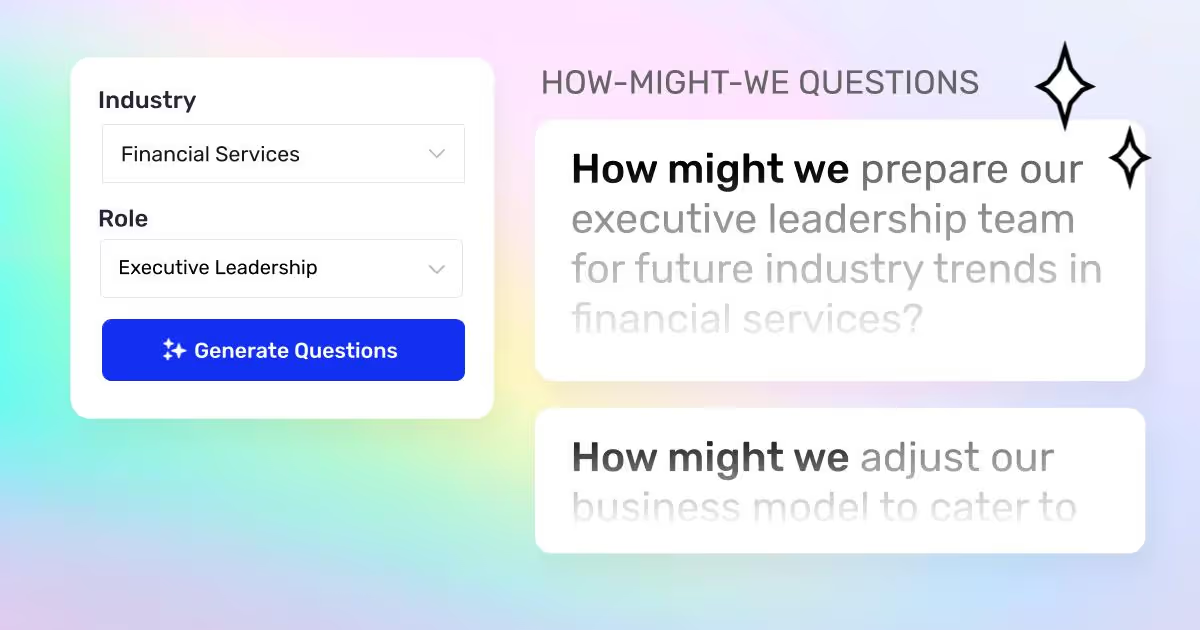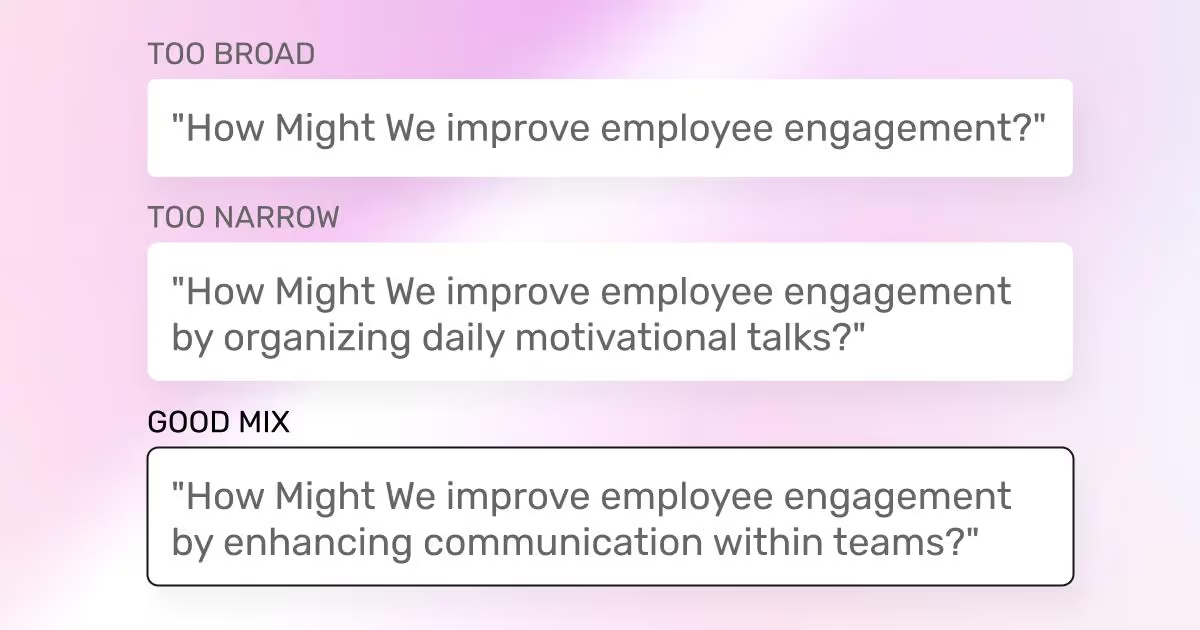How-Might-We Question Generator
Examples of problem statements in the form of how might we questions. Generate a proper problem statement template for your business with this free AI design thinking framework helper tool.
Empower Your Idea Collection with AI-Generated Questions

Save Time
Quickly generate relevant questions without spending hours brainstorming.

Enhance Creativity
Get unique and diverse questions that spark innovative ideas.

Customize Easily
Tailor the questions to suit your specific topic or audience.
How Does the AI Question Generator Work?
Simply input your industry and role as well as a topic or area you want to explore, and our AI will generate 10 insightful how-might-we questions designed to provoke thought and inspire new ideas.
Each of the ten questions comes from a different angle so you have maximum variety of examples to choose from.


Why Use AI for Generating Questions?
AI analyzes vast data to create questions that might not occur to you, leading to more diverse perspectives and uncovering hidden opportunities

What Are "How Might We" Questions?
The concept of "How Might We" questions originated in the design thinking methodology, which emphasizes empathy, ideation, and iterative testing. Pioneered by design firms like IDEO in the 1990s, this approach sought to humanize problem-solving by focusing on the needs and experiences of users. HMW questions quickly gained popularity as they facilitated a shift from problem-focused thinking to solution-oriented brainstorming, making them a staple in workshops and innovation sessions worldwide.
"How Might We" (HMW) questions serve as a powerful tool to focus creativity. These open-ended prompts encourage teams to think expansively and collaboratively about challenges and opportunities. By framing problems in a way that invites exploration and creativity, HMW questions help unlock innovative solutions across various fields, including product development, education, and organizational change.
HMW questions also play a vital role in the design thinking process. They fit seamlessly into various stages: Empathize (understanding user needs helps frame relevant HMW questions), Define (clearly articulating the problem allows teams to craft targeted HMW prompts) and Ideate (this is where HMW questions shine; they drive focused idea generation).
Why "How Might We" Questions Are Effective
Engaging Team Collaboration
One of the primary benefits of HMW questions is their ability to foster collaboration among team members. By inviting diverse perspectives and encouraging open dialogue, these questions create an inclusive environment where everyone feels empowered to contribute ideas. This collaborative spirit enhances creativity and leads to more comprehensive solutions.
Facilitating Structured Problem-Solving
HMW questions provide a structured framework for brainstorming. They help teams break down complex problems into manageable parts, allowing for focused discussions on specific aspects of a challenge. This structured approach not only streamlines the ideation process but also ensures that all relevant angles are explored.
Creating Good "How Might We" Questions
Creating impactful HMW questions requires thoughtfulness and clarity. Here are some steps to guide you:
1. Identify the Challenge: Begin by clearly defining the problem or opportunity you want to address.
2. Frame the Question: Use the phrase "How might we..." followed by a specific action or goal related to the challenge. For example, "How might we increase user engagement on our platform?"
3. Go for Open-Endedness: Ensure that your question is broad enough to allow for multiple solutions but focused enough to guide discussion.
4. Iterate and Refine: Don’t hesitate to revise your questions based on feedback from team members. Iteration can lead to more refined and effective prompts.
Examples of "How Might We" Questions
HMW questions can successfully applied in all kinds of contexts.
Here are some examples:
A tech company might ask, "How might we enhance user experience in our app?" This question leads to brainstorming sessions focused on user interface improvements or new features.
An educator could pose the question, "How might we make learning more engaging for students?" This could spark discussions around interactive learning methods or technology integration.
A nonprofit organization might ask, "How might we increase community involvement in our programs?" This could lead to ideas for outreach initiatives or partnership opportunities.
Common Pitfalls for "How Might We" Questions
While HMW questions are powerful tools, there are common pitfalls that teams may encounter:
1. Overly Narrow: Avoid framing questions that are too specific; this can stifle creativity. Ensure your questions invite broad exploration.
2. Lack of Follow-Up: After generating ideas, it’s crucial to discuss next steps for implementation. Without follow-up, valuable insights may be lost.
3. Dominance by Few: Encourage quieter team members to share their thoughts by creating an inclusive atmosphere where all voices are heard.

By being aware of these challenges and proactively addressing them, teams can maintain a productive brainstorming environment.
Now that you understand the power of "How Might We" questions, why not try crafting your own? Explore related tools and templates available on our website to further enhance your creative processes!
Turn Questions into Ideas
Frequently asked Questions

You can use the questions without an account. However, signing up allows you to save and organize your generated questions for future reference

Yes, when creating idea collections inside Ideanote you can have AI prefill the content and suggest possible HMW questions.

Using "How Might We" (HMW) questions in team brainstorming make people think more creatively by encouraging open-ended exploration of solutions.
Formulating challenges as How Might We Statements invites diverse perspectives, allowing all team members, regardless of their roles, to contribute ideas.
It democratizes the ideation process and makes collaboration easier, as team members can build on each other's thoughts, leading to more innovative outcomes. Additionally, HMW questions help maintain a user-centric focus, ensuring that proposed solutions address real needs and pain points.


